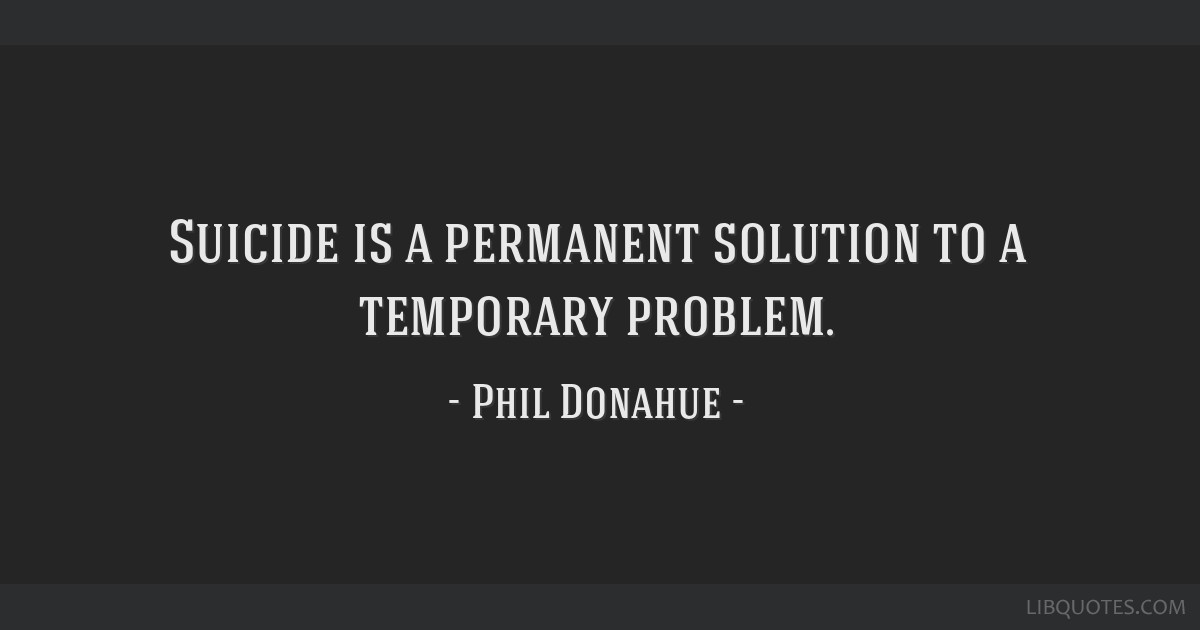![SUICIDE QUOTES [PAGE - 9] | A-Z Quotes](https://www.azquotes.com/picture-quotes/quote-suicide-is-a-permanent-solution-to-a-temporary-problem-suicide-is-a-choice-and-i-think-peter-lynch-77-30-17.jpg)
Suicide is a Permanent Solution to a Temporary Problem
The Agony of Loss
I miss my friend, Christina. It had been a while since we last saw each other, but I was planning to meet her for lunch when I received the tragic news. Christina had taken her own life. She was only 40 years old.
My mind was flooded with questions: What had happened? Why hadn’t she reached out for help? Why had she done this? I couldn’t shake the feeling that I should have known. After all, I was her friend. But perhaps I was too caught up in my own life to notice her struggles.
Understanding the Darkness
The Enigma of Suicide
Suicide is a complex and often misunderstood act. It can be difficult for those left behind to comprehend the motivations of someone who would take their own life. Suicide is a permanent solution to what often feels like an unbearable, temporary problem.
However, it’s important to remember that suicide is not a sign of weakness or cowardice. Rather, it is the tragic consequence of overwhelming pain, hopelessness, and despair. Often, those considering suicide feel like they have no other options.
Historical and Cultural Context
Suicide has occurred throughout human history and across different cultures. In ancient Greece, philosophers such as Plato and Aristotle debated the morality and legality of suicide. In Japan, seppuku (ritual suicide) was a form of honorable death for samurai.
Today, suicide remains a significant public health concern. The World Health Organization estimates that over 700,000 people die from suicide each year. In the United States, suicide is the tenth leading cause of death for all ages.
The Impact of Suicide
Suicide has a devastating impact not only on those who die from it but also on their families, friends, and communities. The loss of a loved one to suicide can leave survivors feeling devastated, guilty, and alone.
Suicide also has a ripple effect on society as a whole. It can disrupt families, strain relationships, and lead to increased mental health problems in communities. The stigma surrounding suicide can prevent people from seeking help, which can lead to further tragedy.
Preventing Suicide
Early Intervention and Risk Assessment
Preventing suicide is a multifaceted effort that requires collaboration between individuals, families, communities, and government agencies. Early intervention is crucial. Identifying and assessing those at risk of suicide is essential for providing timely and appropriate support.
Warning signs of suicide include talking about wanting to die or kill oneself, making plans for suicide, giving away belongings, and displaying hopelessness or despair. However, it’s important to note that not all suicidal people will exhibit these behaviors.
Seeking Help and Intervention
If you or someone you know is considering suicide, it is essential to seek professional help immediately. There are numerous resources available, including crisis hotlines, mental health professionals, and support groups.
If you are in immediate danger, call 911 or your local emergency number. A trained operator can provide support, connect you to crisis services, and dispatch emergency responders if necessary.
Expert Advice and Tips
1. Talk to Someone: If you are feeling suicidal, talk to someone you trust, such as a family member, friend, therapist, or crisis line worker.
2. Remember You Are Not Alone: Many people have felt the same way you do. There are people who care about you and want to help you.
3. Seek Professional Help: A mental health professional can help you understand your thoughts and feelings and develop coping mechanisms.
4. Know That There Is Hope: Suicide is a permanent solution to a temporary problem. There is help available, and you can get better.
5. Create a Safety Plan: Identify specific steps you can take to stay safe when you are feeling suicidal, such as calling a crisis hotline or going to the hospital.
FAQs on Suicide
Q: What are the warning signs of suicide?
A: Warning signs of suicide include talking about wanting to die or kill oneself, making plans for suicide, giving away belongings, and displaying hopelessness or despair.
Q: What should I do if someone I know is considering suicide?
A: If you or someone you know is considering suicide, it is essential to seek professional help immediately. Talk to someone you trust, call a crisis hotline, or go to the hospital.
Q: What resources are available for suicide prevention?
A: There are numerous resources available for suicide prevention, including crisis hotlines, mental health professionals, and support groups. You can also find information on suicidiology.org.
Conclusion
Suicide is a complex and tragic issue that affects individuals, families, and communities worldwide. By understanding the causes, risks, and consequences of suicide, we can work together to prevent this devastating outcome.
If you are struggling with suicidal thoughts, know that you are not alone. There is help available, and you can get better. Please reach out to someone you trust or call a crisis hotline. Your life is precious, and you deserve to live it.
Are you interested in learning more about suicide prevention? Here are some additional resources:
- National Suicide Prevention Lifeline: 1-800-273-8255
- Crisis Text Line: Text HOME to 741741
- Suicidology.org

Image: readingandwritingprojectcom.web.fc2.com

Image: libquotes.com
SUICIDE IS A PERMANENT SOLUTION TO A TEMPORARY PRO T-Shirt | Zazzle.com Andersen forgives Richard, but says suicide is “one down moment” with lifelong consequences for others. “It’s a permanent solution to a temporary problem,” she says. “And there’s